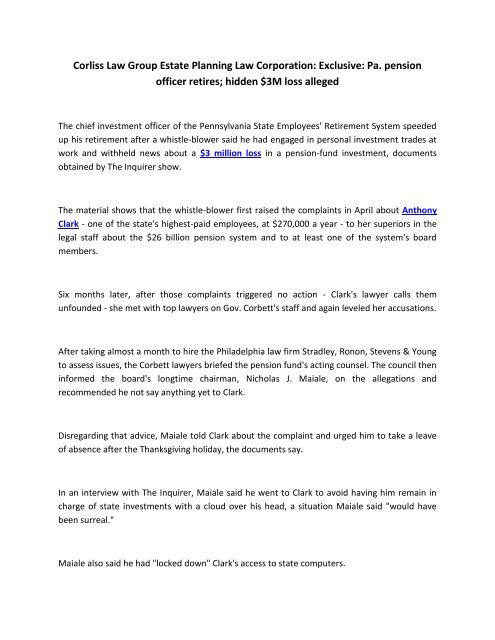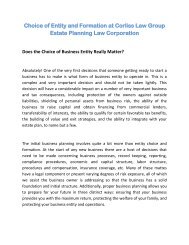Corliss Law Group Estate Planning Law Corporation: Exclusive: Pa. pension officer retires
Create successful ePaper yourself
Turn your PDF publications into a flip-book with our unique Google optimized e-Paper software.
<strong>Corliss</strong> <strong>Law</strong> <strong>Group</strong> <strong>Estate</strong> <strong>Planning</strong> <strong>Law</strong> <strong>Corporation</strong>: <strong>Exclusive</strong>: <strong>Pa</strong>. <strong>pension</strong><br />
<strong>officer</strong> <strong>retires</strong>; hidden $3M loss alleged<br />
The chief investment <strong>officer</strong> of the Pennsylvania State Employees' Retirement System speeded<br />
up his retirement after a whistle-blower said he had engaged in personal investment trades at<br />
work and withheld news about a $3 million loss in a <strong>pension</strong>-fund investment, documents<br />
obtained by The Inquirer show.<br />
The material shows that the whistle-blower first raised the complaints in April about Anthony<br />
Clark - one of the state's highest-paid employees, at $270,000 a year - to her superiors in the<br />
legal staff about the $26 billion <strong>pension</strong> system and to at least one of the system's board<br />
members.<br />
Six months later, after those complaints triggered no action - Clark's lawyer calls them<br />
unfounded - she met with top lawyers on Gov. Corbett's staff and again leveled her accusations.<br />
After taking almost a month to hire the Philadelphia law firm Stradley, Ronon, Stevens & Young<br />
to assess issues, the Corbett lawyers briefed the <strong>pension</strong> fund's acting counsel. The council then<br />
informed the board's longtime chairman, Nicholas J. Maiale, on the allegations and<br />
recommended he not say anything yet to Clark.<br />
Disregarding that advice, Maiale told Clark about the complaint and urged him to take a leave<br />
of absence after the Thanksgiving holiday, the documents say.<br />
In an interview with The Inquirer, Maiale said he went to Clark to avoid having him remain in<br />
charge of state investments with a cloud over his head, a situation Maiale said "would have<br />
been surreal."<br />
Maiale also said he had "locked down" Clark's access to state computers.
But after learning that Maiale had told Clark about the allegations, Corbett's lawyers rushed to<br />
preserve Clark's e-mail and computer records "to protect the agency from the potential<br />
consequences of your un-counseled notification to Mr. Clark," a top state lawyer told Maiale in<br />
a letter Wednesday.<br />
That letter, obtained by The Inquirer, was given to the SERS board Wednesday in a closed-door<br />
executive session in Harrisburg.<br />
The board was also given Stradley Ronon's report reviewing the allegations and assessing<br />
whether they should be reported to federal securities regulators or the state ethics board. In its<br />
14-page assessment, obtained by The Inquirer, the law firm said there was no requirement to<br />
report the situation to authorities at that time and urged further investigation.<br />
On Thursday, state Treasurer Rob McCord, a member of the SERS board, called upon Corbett to<br />
remove Maiale as chair. McCord cited Maiale's failure to act more quickly on allegations of<br />
"possible criminal or unethical conduct" by Clark.<br />
McCord, an announced candidate for governor in next year's Democratic primary, also<br />
lambasted Corbett's lawyers for not acting sooner.<br />
In a sign of a widening partisan fight, Corbett's Office of General Counsel issued a statement<br />
Friday suggesting that it was McCord and other board members who had dropped the ball.<br />
"The real question now is what the fiduciaries to SERS, including the treasurer, knew and when<br />
they knew it," the statement read.<br />
State Attorney General Kathleen Kane, a Democrat, has also requested documents related to<br />
the complaints against Clark. Her office declined all comment Friday.
Clark, 60, chose to retire early from the job after his talk with Maiale. He was hired in 2011.<br />
In the interview, Maiale praised Clark and called him an assertive boss who pushed workers to<br />
perform and who may have made enemies on the staff.<br />
"I think he did a fine job," Maiale said. "The investment program is a lot better. It's been<br />
repositioned. The returns are good."<br />
The SERS whistle-blower alleged that Clark removed information from a report to the board,<br />
which would have showed the Tiger Keystone <strong>Pa</strong>rtners hedge fund had lost $3 million and cost<br />
SERS $1 million in additional administrative fees.<br />
Clark had advised the board that the $250 million Tiger investment was expected to yield $20<br />
million to $30 million a year in profit for SERS, providing stocklike high returns with bondlike<br />
low volatility.<br />
For Tiger to lose money, instead of meeting its projection, would be an extra embarrassment<br />
for Clark, who had strongly recommended the investment.<br />
The whistle-blower told lawyers that staff members believed concealing the loss would make it<br />
hard to trust Clark on other investments he recommended.<br />
Clark's attorney, Virginia Gibson, of the Hogan Lovells law firm in Philadelphia, said in a<br />
statement: "Mr. Clark was planning to retire in the near future, and when this arose, he chose<br />
the earlier date of Dec. 31," instead of waiting until next year.<br />
She added: "He is looking forward to an early resolution of these unfounded allegations."
Maiale, a Philadelphia Democrat and onetime state representative, has chaired the politically<br />
appointed SERS board under Republican Gov. Corbett and four previous governors, both<br />
Republicans and Democrats.<br />
On his watch, SERS has pursued a complex diversification strategy aimed at boosting <strong>pension</strong><br />
assets while guarding against losses in declining markets.<br />
Total SERS gains have exceeded the system's annual 7.5 percent target so far this year, but<br />
lagged behind the surging U.S. stock market.<br />
Despite its outside managers, SERS has faced a growing gap between its assets and its expected<br />
<strong>pension</strong> payouts, which the state has had to meet by increasing taxpayer contributions to the<br />
system - about $1 billion in 2013, more than twice the level of two years ago. The taxpayer<br />
contribution is projected to increase to $2 billion by 2016. That has prompted Corbett to refer<br />
to SERS as "a tapeworm" in his budget.<br />
The <strong>pension</strong> system paid at least $176 million in fees in 2012 to private money-management<br />
firms to invest slices of its portfolio.<br />
The whistle-blower first alleged wrongdoing by Clark in April to SERS's top lawyer and board<br />
member Oliver C. Mitchell Jr., according to the Dec. 11 letter to Maiale by Corbett lawyer Jarad<br />
W. Handelman, first executive deputy general counsel.<br />
The Inquirer has not been able to identify the whistle-blower, although the documents make<br />
clear she was a lawyer at the <strong>pension</strong> fund. Her name was blacked out in the material provided<br />
to the <strong>pension</strong> board.
Among other complaints, the woman said she believed Clark worked about three days a week,<br />
not the required full week, the documents say.<br />
She also said that while she believed Clark engaged in personal "day trading," she did not allege<br />
he had traded in stocks held by the <strong>pension</strong> fund.<br />
The Stradley Ronon lawyers, in their report to Corbett's office, said they would need to know<br />
what Clark was trading and whether he was using information from SERS or its hired managers.<br />
Both the Handelman letter and the Stradley Ronon report recommended a more complete<br />
investigation.<br />
SERS trustees voted at their meeting Wednesday to hire an independent law firm to investigate<br />
the allegations.<br />
Asked about his prospects, Maiale said: "I've been there 22 years. I don't know how much<br />
longer I want to be there. I don't know how long [Corbett] wants me there. But I've done a<br />
good job."







